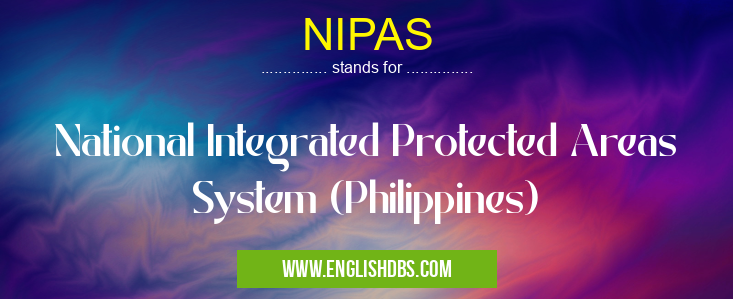What does NIPAS mean in LAW & LEGAL
The National Integrated Protected Areas System (NIPAS) is an effort by the Philippine government to create a system of protected areas in the country that are managed for sustainable use and conservation of natural resources. NIPAS seeks to protect the country's biological diversity while allowing for sustainable and equitable sharing of benefits derived from its use. The program also aims to ensure that local communities have access to these resources and can participate in their management. It is also a tool for promoting environmental education, awareness-raising, and livelihood sustainability.

NIPAS meaning in Law & Legal in Governmental
NIPAS mostly used in an acronym Law & Legal in Category Governmental that means National Integrated Protected Areas System (Philippines)
Shorthand: NIPAS,
Full Form: National Integrated Protected Areas System (Philippines)
For more information of "National Integrated Protected Areas System (Philippines)", see the section below.
What is NIPAS?
The National Integrated Protected Areas System (NIPAS) is a multi-sectoral effort led by the Philippine government to establish a comprehensive network of terrestrial, coastal, and marine protected areas. These protected areas will be managed through integrated strategies to conserve biodiversity and promote sustainable development. This network includes national parks, marine reserves, game refuges, critical habitats, watersheds, buffer zones, multiple use areas, nature sanctuaries and cultural sites. In addition, it provides opportunities for research and education on natural resource conservation issues. The program is implemented through coordinated efforts between various stakeholders including local government units; private sector organizations; nongovernmental organizations (NGOs); community-based organizations; and indigenous peoples' groups. In particular, local communities have been actively involved in this initiative since its inception as they are essential partners in both planning and implementation activities related to NIPAS.
Objectives of NIPAS
The main objectives of NIPAS are as follows: 1) To protect ecologically significant terrestrial, coastal/marine environments that are important habitats for biodiversity; 2) To ensure effective conservation management through meaningful participation of all stakeholders; and 3) To promote sustainable resource utilization by local communities living within or around protected areas through benefit sharing agreement arrangements among different sectors involved in the implementation process.
Essential Questions and Answers on National Integrated Protected Areas System (Philippines) in "GOVERNMENTAL»LAW"
What is NIPAS?
NIPAS stands for National Integrated Protected Areas System, a Philippine system composed of protected areas and other sites essential to biodiversity conservation. The system aims to maintain natural ecological processes and life-support systems as well as conserve genetic diversity in the country.
How many protected areas are there under NIPAS?
As of 2019, there are 199 protected areas with a total coverage of 1,941,217 hectares nationwide.
What kind of protected areas are included in NIPAS?
NIPAS includes national parks, wildlife sanctuaries, natural monuments, game preserves and other protected areas that sustain the rich biodiversity and unique ecosystems of the Philippines.
How does NIPAS protect Philippine biodiversity?
By conserving key habitats such as rivers, coral reefs and forests that are essential for sustaining life in the country. It also provides measures to help recover threatened species and habitats by reducing threats from destructive human activities such as deforestation and illegal fishing among others.
Who administers NIPAS?
The National Integrated Protected Areas System is managed by the Department of Environment and Natural Resources (DENR).
What are the goals of NIPAS?
The main goals of NIPAS are to protect Philippine's natural resources, promote sustainable development within its boundaries, contribute to climate change adaptation efforts, create resilient livelihoods for local communities through proper resource management practices; preserve indigenous cultures; and increase public awareness on conservation issues.
How can I support conservation efforts under NIPAS?
You can contribute by volunteering or donating items or funds to various organizations that work to protect the environment in the Philippines. You can also advocate for stricter environmental laws at your local level so that more stringent measures can be taken against polluting activities or illegal logging within protected areas. Additionally, you can spread awareness through social media by sharing facts about conservation initiatives in your community or elsewhere around the globe.
What incentives do communities living near protected areas get from NIPAS?
Communities living near protected areas benefit from increased employment opportunities provided by eco-tourism businesses such as guided tours or locally made products sold at souvenir shops inside these sites; improved access to clean drinking water due to enhanced watershed protection; increased availability of spiritual places; improved health benefits due to increased availability of medicinal plants; increased opportunities for recreational activities like swimming or camping; greater understanding between cultures due to intercultural education programs organized by DENR; and more sustainable farming practices which address food security issues.
Final Words:
Overall the National Integrated Protected Areas System (NIPAS) has helped to protect many important habitats in the Philippines while providing opportunities for research, education on natural resource conservation issues and for sustainable resource utilization by local communities living within or around the protected areas. By implementing an integrated approach involving multiple stakeholders such as local government units; private sector organizations; NGOs; community-based organizations ;and indigenous peoples' groups this program has been successful in both protecting ecologically significant environments as well as promoting participation from the entire country in managing these locations sustainably which will be beneficial towards achieving mutually shared goals across multiple sectors into the future.
